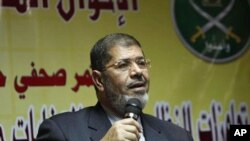After Egypt’s President Hosni Mubarak pledged in a televised address to remain in office only until the next election and after protests in Cairo’s Tahrir Square turned violent, VOA’s Lamia Gritly turned to Mohamed Morsi, a leading member of the opposition Muslim Brotherhood for an assessment of the situation.
|
Listen to the full interview with Mohamed Mosri:
|
In Morsi’s view, Mubarak’s offer to remain in power no longer than September comes too late. He says the Egyptian leader has already “failed” and that the “game is over.” Morsi also believes it is Mubarak and his people who stand behind the violence that has erupted in Cairo’s Tahrir Square and that it is mainly plain-clothed members of his security forces who are attacking civilian protesters there.
“The world now can see how Mubarak is failing continuously, and the end is very close,” said Morsi.
Asked about concerns that, if Mubarak’s government were to fall, an Iranian-type regime would come in its place, the Muslim Brotherhood spokesman sidestepped the issue by saying that members of his movement constitute only about five to ten percent of the millions of protesters in the streets and that they all share one common goal – freedom, democracy and justice for all Egyptians. He also insisted that even an Islamic state can be “civilian” [i.e. secular] in nature.
Morsi at the same time denies plans of a Muslim Brotherhood take-over saying that his movement wants freedoms to be shared between Egypt’s Muslims and Christians, women and men.
“We want freedom and justice, we want free elections, and for people to [be able] to choose whomever they want to choose,” Morsi said.
He says that even if the brotherhood wanted to take over, it could not, considering the young age and often secular persuasion of the majority of the protesters that have filled the streets in recent days.
Morsi also denies rumors that the Muslim Brotherhood had given a mandate to opposition figure Mohamed ElBaradei to speak on the movement’s behalf. ElBaradei, he says, is merely one of many opposition figures who should be involved in negotiating for Egypt's future after Mubarak.




